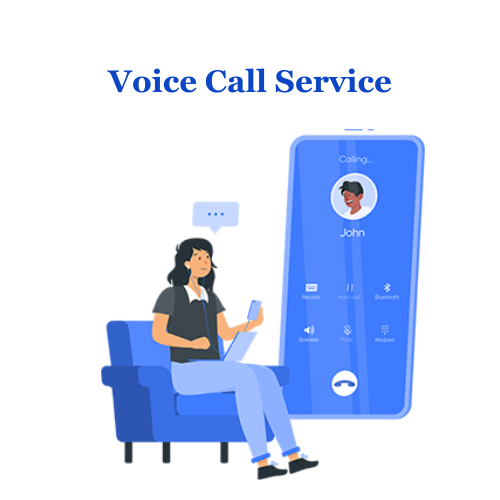Amidst the array of communication tools available, voice call services have emerged as a powerful ally for small businesses seeking to engage with their audience effectively. This blog explores the essence of voice call services, their functionality, and five compelling ways they can benefit small businesses in today’s competitive market. Use this service with the best voice call service provider India.
What is Voice Call?
Voice call services, also known as telephony or phone services, involve the transmission of audio signals between two or more parties over a telecommunications network. In the context of business communication, voice call services encompass a range of tools and technologies that enable businesses to make and receive phone calls, both internally and externally. These services facilitate real-time communication, fostering collaboration, and connection between businesses and their stakeholders.
How Does it Work?
The functionality of voice call services revolves around the transmission of audio signals between two or more parties over a telecommunications network. Here’s a detailed breakdown of how voice call services work:
Initiation
A voice call is typically initiated when a caller dials a phone number associated with the recipient. This phone number can be a landline, mobile number, or a virtual number provided by a voice call service provider.
Connection Establishment
Once the caller dials the phone number, the call is routed through a series of networks, including local exchanges, long-distance carriers, and internet protocols (for VoIP calls). The recipient’s phone system receives the incoming call request and establishes a connection between the caller and the recipient.
Signal Transmission
Once the connection is established, audio signals are transmitted between the caller’s and recipient’s devices in real-time. These signals carry the voice data, allowing both parties to hear and speak to each other during the call.
Voice Transmission
As the conversation progresses, the voice data is converted into electrical signals by the caller’s microphone, transmitted over the phone network, and then converted back into audible sound by the recipient’s speaker. This process occurs continuously throughout the duration of the call, enabling seamless communication between the parties.
Termination
The call concludes either manually when one of the parties hangs up or automatically after a predetermined duration. When the call is terminated, the connection between the caller and recipient is severed, and both parties return to their standby state, ready to make or receive another call.
Additional Features
In addition to the basic functionality of making and receiving calls, voice call services may offer a variety of additional features to enhance communication. These features may include call recording, voicemail, call forwarding, conference calling, interactive voice response (IVR) systems, and more. These features add versatility and flexibility to voice call services, allowing businesses to tailor their communication strategy to meet their specific needs and preferences.
5 Ways Voice Call Services Benefit Small Businesses
Enhanced Customer Communication
Voice call services provide small businesses with a direct and personal channel for communicating with customers. Unlike emails or text messages, voice calls offer a human touch and real-time interaction, allowing businesses to address inquiries, resolve issues, and build rapport with their customer base. By engaging in meaningful conversations over the phone, businesses can foster loyalty and satisfaction among their customers, leading to increased retention rates and positive word-of-mouth referrals.
Increased Accessibility
Voice call services enable small businesses to maintain constant accessibility, regardless of their physical location. With features such as call forwarding and mobile apps, businesses can stay connected with customers and stakeholders, ensuring timely responses and efficient communication. Whether in the office, on the go, or working remotely, small business owners and employees can easily manage incoming calls and stay connected with their audience, enhancing responsiveness and customer satisfaction.
Cost-Effective Communication
Compared to traditional modes of communication such as postal mail or in-person meetings, voice call services offer a cost-effective solution for small businesses. With affordable pricing plans and pay-as-you-go options, businesses can manage communication expenses more efficiently, minimizing overhead costs. By leveraging voice call services for customer support, sales calls, and internal communication, small businesses can achieve significant cost savings while maintaining high levels of service and productivity.
Improved Team Collaboration
Voice call services facilitate seamless collaboration among team members, regardless of their geographical location. With features such as conference calling and call recording, businesses can conduct virtual meetings, brainstorming sessions, and training sessions, enhancing productivity and teamwork. By bringing together dispersed teams and enabling real-time communication, voice call services empower small businesses to collaborate effectively, share ideas, and drive innovation.
Data-driven Insights
Many voice call services offer analytics and reporting tools that provide valuable insights into call performance, customer interactions, and trends. By analyzing data such as call duration, call volume, and customer feedback, small businesses can gain actionable insights into their communication activities. These insights enable businesses to make informed decisions, refine their communication strategies, and identify areas for improvement. By leveraging data-driven insights, small businesses can optimize their campaigns, enhance customer engagement, and achieve their business objectives more effectively.
By leveraging the features and functionalities of IVR services, small businesses can build stronger relationships with their customers, streamline internal communication, and drive success in today’s competitive market.
Guidelines
- Regulatory Compliance: Familiarize yourself with relevant regulations governing IVR services in India, such as those set forth by the Telecom Regulatory Authority of India (TRAI). Ensure compliance with regulations related to customer consent, telemarketing practices, and data privacy to avoid penalties and legal issues.
- Obtain Consent: Before initiating campaigns, obtain explicit consent from recipients to receive voice calls from your business. Maintain records of consent, including the date, time, and method of consent, to demonstrate compliance with regulations.
- Respect Do Not Disturb (DND) Registry: Check the National Do Not Call (NDNC) registry maintained by TRAI to ensure that your campaigns do not target numbers registered on the DND list. Avoid making unsolicited calls to numbers listed on the DND registry to prevent complaints and regulatory violations.
- Provide Opt-out Mechanism: Offer recipients the option to opt out of receiving voice calls from your business by providing clear instructions on how to unsubscribe or opt out of future communications. Honor opt-out requests promptly and update your contact list accordingly to respect recipient preferences.
SpaceEdge Technology: Your Trusted Bulk Voice Call Service Provider
SpaceEdge Technology prides itself on being at the forefront of communication solutions, empowering businesses to connect with their audience effortlessly. As a leading provider of bulk voice call services, we offer a seamless platform that enables organizations to deliver personalized messages to thousands of recipients simultaneously.
Read more: https://dailytipshive.com/, https://dailytipshive.com/



